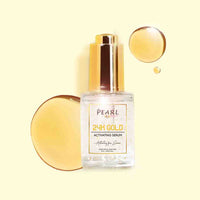Excessive sebum production on the scalp is very frustrating for most people. Sebum is a natural oil secreted by the sebaceous glands that help to keep the scalp and hair moisturized. When too much sebum is produced, it leads to oily hair, clogged hair follicles, dandruff or seborrheic dermatitis. Many people are struggling with oily scalp, and you are fortunate that there are ways to reduce sebum production without disrupting scalps health. Let us understand the causes of excess sebum and the treatments, tips to control oil production in your scalp.
What Causes Excess Sebum Production on the Scalp?
Before understanding how to reduce sebum production, let’s know the factors that contribute to oily scalp.
Genetics
As we all know that genetics play a significant role in all aspects of our health and body. If your parents scalp or hair is oily, chances that you too are prone to develop excess oil production.
Hormonal Changes
Hormones especially androgens which are present in both men and women stimulate the sebaceous glands to produce more sebum. Fluctuations in the hormones during puberty, menstruation, pregnancy and menopause can trigger oily scalp.

Diet
Most of us are not aware that intake of greasy, processed foods and sugar items can exacerbate oil production. In some individual’s dairy products too can increase sebum secretion. Diets with refined carbohydrates and unhealthy fats can also promote sebum production.
Stress
When you are under stress, it triggers production of cortisol, and this hormone can in turn activate sebaceous glands that can lead to excess oil production.
Over Washing or Harsh Hair Care Products
Its ironical but washing the hair too often with harsh shampoos can strip the scalp with its natural oils, which can turn up with more sebum production.
Weather and Humidity
Weather conditions like hot or humid and more sweat can mix with excess sebum leaving the hair greasy faster.
How to Reduce Sebum Production on the Scalp
Lets dive into the effective ways to reduce sebum production on your scalp.
Choose the Right Shampoo
Pick the shampoos that can balance oil production and are specifically formulated for oily hair and oily scalp. The key ingredients to look for in the shampoo are
Salicylic acid
Exfoliate the scalp too like the skin as it unclogs the hair follicles and prevents excel oil buildup.
Tea tree oil
With its antimicrobial properties, it helps to regulate oil production and combat scalp irritation.
Charcoal or clay
They are capable of absorbing excess oil and keep it clean.
Citrus extracts
Ingredients like lemon, lime and orange have astringent property that controls excess oil.

It is good to avoid shampoos with harsh sulfates or alcohols as they strip scalp natural oils as a result scalp produces more oil.
Wash Your Hair Less Frequently
It might seem counterintuitive, washing the hair less frequently helps to reduce sebum production over time. Over washing strips, the hairs natural oils and prompts sebaceous glands to produce more sebum to compensate for the dryness. To achieve it, try to wash your hair every other day or two or three times a week depending on the scalp’s requirements. Using a dry shampoo to wash your hair will absorb excess oil and refresh your hair.
Massage Your Scalp Regularly
Massaging scalps for a few minutes each day improves blood circulation and improves oil production as massaging distributes natural oils on the scalp to rest of the hair. Use your fingertips or scalp massager for better absorption.
Use Apple Cider Vinegar Rinses
Apple cider vinegar (ACV) helps balance pH of your scalp and regulates oil production. It possesses antimicrobial properties that improves the skin health. To use
- Add 1-2 tablespoons of apple cider vinegar to a cup of water.
- After shampooing, pour the mixture onto your scalp and massage gently.
- Leave it on for 1-2 minutes before rinsing thoroughly with cool water.
- ACV helps to clarify the scalp, remove excess buildup, and prevent oily residue.
Avoid Overusing Hair Products
Avoid using too many hair products like styling gels, sprays or creams as they accumulate on the scalp and make oil control. These products can clog hair follicles, leading to irritation on the scalp and chances to develop dandruff.
Adjust Your Diet
What we eat impacts your skin and scalp health. To regulate sebum production, focus on balanced diet with fruits and vegetables, lean proteins, and healthy fats. Its better to avoid greasy or processed foods and limit sugar consumption as it manages oil levels. Aim to drink 8 glasses of water as it keeps the skin and scalp hydrated and flushes out toxins that contribute to oily hair.
Consider Tea Tree Oil or Witch Hazel
Tea tree oil and witch hazel are natural astringents that reduce excess oil on the scalp. Tea tree has antifungal and antibacterial properties that make the scalp healthy while witch hazel tightens the skin and reduces oil production. Add few drops of tea tree oil to your shampoo or mix witch hazel with water and apply directly to your scalp.
Additional Tips For Healthy Scalp
- Don’t touch your hair too often – Touching your hair often throughout the day transfers oils from your hands to the scalp. It makes your problem worse.
- Shower with cooler water – When we use hot water for shower, hot water stimulates oil production. Using lukewarm or cool water is good to wash your hair.
-
Keep your hairbrush clean – Clean your hairbrush to removes oil buildup and prevents from redistribute onto your scalp.
· Conclusion
Excess sebum production on the scalp is a challenge for everyone. One needs to find the right approach to control and balance oil levels. Choose appropriate shampoos, adjust your hair wash routine, massage your scalp and a healthy lifestyle can keep your scalp healthy, fresh-looking hair. Be consistent with these practices and you can see improvements in scalp health over time!!










